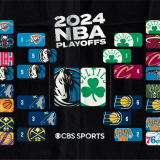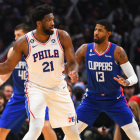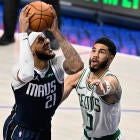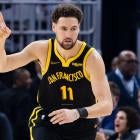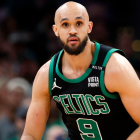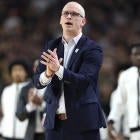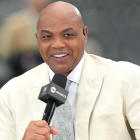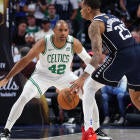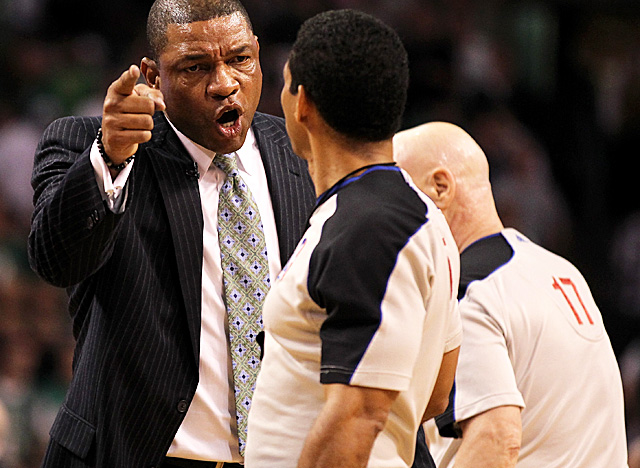 |
| Doc Rivers goes to bat for his Celtics in Game 2 as foul calls seemed to favor Miami. (Getty Images) |
MIAMI -- NBA officiating has always been seen through fan-colored glasses. Your team never gets enough calls. The other team is a bunch of floppers.
Even before the Tim Donaghy betting scandal in 2007, a thriving underworld of conspiracy theorists has populated the sport with the notion -- real or imagined -- that sinister forces behind the curtain are manipulating NBA officiating. Whether the goal is to extend playoff series as long as possible or give a favorable whistle to so-called big-market teams -- both, presumably, to maximize TV revenues -- everybody has a different slant on their theory that NBA referees are a rotten bunch.
| More on Conference finals |
| Related links |
|
| More NBA coverage |
|
Nonetheless, the NBA has a problem. A perception problem. And perception drives ratings, drives the entire business model. If enough customers lose confidence in the legitimacy of the product, they won't consume the product anymore.
Which brings us to the epicenter of officiating controversy, at least for the moment: the Eastern Conference finals.
To review: In Game 2 at Miami, LeBron James attempted 24 free throws and the Celtics attempted 29. (Just ask Doc Rivers, who strategically supplied this statistic in his postgame news conference.) Also, Paul Pierce fouled out and missed the entire overtime period, and an obvious foul by Dwyane Wade on Rajon Rondo's face as the Celtics' point guard drove to the basket late in the game wasn't called.
In Game 4 at Boston, there were 12 -- twelve! -- offensive fouls called, including one each on Pierce and James in overtime that fouled them out of the game. It was the third time in five playoff games that Pierce had fouled out. For James, it was only the fourth time in his career -- and first time in the playoffs -- that he'd been disqualified.
In Oklahoma City Monday night night, the flopping epidemic -- or, at least what appears to the untrained eye to be an epidemic -- was on full display. It was a wonder that Tony Parker was able to make it to the shower and back without getting sprawled out on the floor when the locker-room attendant threw him a towel.
The league's officiating department grades every call and non-call during the regular season and playoffs, but the league office declined to make such assessments available to CBSSports.com and other media outlets that have requested them. No American pro team sport makes such data public.
On one hand, such data might only reinforce that the officials are right the vast majority of the time, but it's a no-win situation. First of all, the referees' union would never allow what amount to internal performance reviews to be made public. Also, if the officials' batting average were suspiciously low, it would support the notion that the refs are incompetent. If the league grades were too high, it would only provide more ammunition for the conspiracy theorists.
So absent that info, what's going on? Players are smart, and they've become very good at "selling" calls, making incidental contact look like felonious assault. Also, the NBA game is so fast and physical that it's almost impossible to officiate. The block-charge call is perhaps the most difficult one to make in any sport, and now it's a triple threat: the block-charge-flop.
"I'm going to play how I always play," James said at shootaround Tuesday as the Heat and Celtics prepared for Game 5. "I'm not a big foul guy. I think I probably average 1.5 or two fouls a game. I'm going to play how I play. I'm not going to be worried about the fouls that will be called against me. I'm just going to go out and play."
After fouling out in Game 4 -- with four of the fouls offensive -- James sat at his locker and repeatedly uttered the word "whatever" in reference to how he was officiated. "I don't foul out," he said.
So why did he?
As is typically the case, nearly every one of the 12 offensive fouls called in Game 4 was a bang-bang play that could've gone either way. I know, because I reviewed video of all 12 of them with the incredible statistical resource that the league makes available to the media, NBA.com/stats. Here's what I concluded: I had a problem with four of them, but only a serious problem with the last two -- the offensive foul on Pierce that fouled him out and the offensive foul on LeBron that fouled him out, both in overtime.
This little exercise underscored how the calls aren't always what they seem to be in the arena or on TV, much less to the officials in real time. And it's a small sample size, but the numbers from the 2011 and 2012 playoffs show that there has not been a discernible increase in offensive fouls during this postseason.
During the 2011 playoffs, there was an average of 43 personal fouls per game, 3.6 of which were offensive (8.4 percent). In the 2012 playoffs so far, there has been an average of 42.4 personal fouls per game, 3.7 of which have been offensive (8.6 percent). These are hardly the symptoms of an epidemic.
The thing is, we watch the games, and we see Parker or Pierce or Blake Griffin go down as though shot with a tranquilizer gun, and it feeds our perception that flopping is ruining the game. And we're not the only ones. Mickael Pietrus, who drew James' sixth foul in Game 4, had such a guilty conscience about the play that he volunteered, "I'm not a flopper," at his locker afterward. The funny part was, he hadn't even been asked if he were a flopper. Not even in French, as far as I could tell.
And commissioner David Stern, upon whose desk the buck must stop with the league's latest officiating controversy, has openly stated his disdain for flopping.
"Some of this is acting," Stern said on the ESPN broadcast during Game 1 of the Eastern Conference semifinals between the Heat and Pacers. "We should give out Oscars instead of MVP trophies."
If Stern, who has long been protective of the league's referee staff -- even in the wake of the Donaghy scandal -- thinks it's a problem, then it's obviously a problem.
Was it a problem in Game 4 of the Eastern Conference finals? Not in my estimation.
* Udonis Haslem's offensive foul in the second quarter was a moving screen on which he threw an elbow to reroute defender Keyon Dooling.
* Brandon Bass' offensive foul moments later was a moving screen on which he jutted out his hip to reroute James Jones.
* LeBron's offensive foul in the second quarter was enhanced by Pierce cleverly falling down, but James can't deny that he used his right arm to push Pierce as he drove to the basket. Whether Pierce goes down or not, it's a foul, and the call wound up being consistent with how the rest of the game would be officiated.
* Rondo's offensive foul with 1:09 left in the second was a legit charge taken by Shane Battier, one of the best charge-drawers in the NBA. (Don't forget, he went to Duke.)
* In the third, Rondo picked up his second offensive foul when he lowered his shoulder into Mario Chalmers while driving to the basket. Chalmers "sold" the call by going down, but it's not a flop when you use your body to gain an advantage on the defender.
* Rondo's fourth personal (and third offensive foul) later in the third wasn't a flop, either. Just a tight, by-the-books call by Bill Kennedy. Rondo had his left arm wrapped around Norris Cole's waist as they battled for post position. It's contact that the officials typically let go, but technically, it's a foul. It's right there on the video.
* James' third foul, an offensive foul on Pietrus late in the third, was a borderline call. James curled around a screen and ran into Pietrus, who'd fought over the screen and cut off James' path. Pietrus also fell down, which is not what you want to do if you're trying to guard LeBron but is what you want to do if you're trying to get a whistle. LeBron didn't do anything to gain an advantage, he just kept moving around the screen. The call could've just as easily been on Pietrus. Better yet, it should've been a non-call.
* In the fourth, James picked up his fourth foul when Pierce stood straight up outside the circle in front of James as he drove to the basket. James shouted at Kennedy, "He slid under me!" But that's not what the video shows. The video shows a clean charge drawn by Pierce -- a good defensive play.
* Same goes for Pierce's fifth foul, another clean charge drawn moments later by Battier, who raced back in transition, got his feet set outside the circle, and absorbed contact from a driving Pierce.
* When James and Kevin Garnett got tangled up under the basket with 21 seconds left in regulation, I would rather have seen a non-call than the offensive foul that was called on Garnett. Garnett did, however, use his right arm to shove James as he fought for position on the block. It was a tight call, but by this point in the game, the officials had set a tone and had been calling offensive contact by the book for more than 47 minutes.
* Finally, to overtime, when Pierce came through the lane around a screen and ran into a stumbling Battier, who spilled to the floor. In my eyes, that was a flop -- and a costly one for the Celtics, who lost Pierce for the final 4:22 of overtime.
* Moments later, James ran the lane in transition and had Pietrus on his hip and backing up on his heels. Pietrus went down and brought James with him, and James was done for the night.
Again, it's a small sample size, but there's nothing in the 12 offensive fouls called in Game 4 that suggests it was part of some grand conspiracy for the referees to manipulate calls or the players to sell them. To the contrary, it was one of the least offensive games, so to speak, that I've seen this postseason as far as flopping goes.
That doesn't mean flopping isn't a problem. It is; we all know it, and the commissioner knows it. The question is, what does the league do about it?
Never mind adopting the FIBA goaltending rule or changing the age limit. Flopping has to be the No. 1 priority for the league's revamped competition committee when it meets this summer. Good, smart people who care about the game -- Rivers among them, since he's on the new committee -- need to dig deep for the best ideas to eradicate the scourge of flopping.
It wasn't, as it turns out, a problem in Game 4 between the Heat and Celtics. But it's still a problem that needs swift and effective solutions.
“It’s a legitimate concern,” Stern said. “Some years ago, I told the competition committee that we were going to start fining people for flopping and then suspend them—and I think they almost threw me out of the room. ... But I think it’s time to look at it in a more serious way, because it’s only designed to fool the referee. It’s not a legitimate play in my judgment."
Schooling up the referees on how to detect flopping and changing the rules to make it another class of personal foul? Good idea in theory, but exceedingly difficult to execute. Keeping track of flops the way the league tracks technical fouls and instituting a fine and suspension schedule? The argument against that would be that flopping is subjective. Then again, so are technical fouls.
Giving the officials the authority to call a technical foul for a flop, awarding one free throw and the ball? That would either stop flopping in its tracks or cause even more chaos. One way or another, it's time to flip the script on flopping before the customers flip to another channel.












